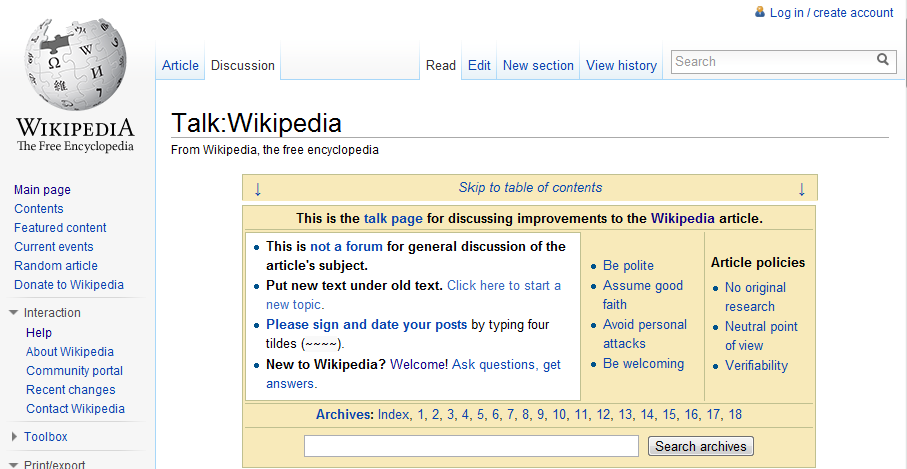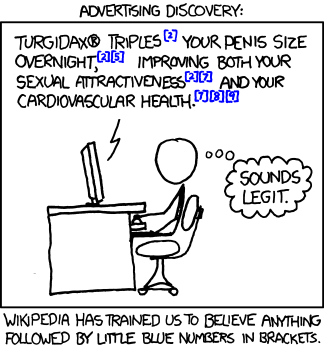Reputation Systems: Wikipedia

Wikipedia, unlike StackOverflow and similar sites, does not have an explicit reputation system. How, then, does a reader decide what Wikipedia content to trust? UCSD philosophy professor P.D. Magnus notes that a reader considers several factors when evaluating online content in general. Such factors include:
- Authority. Does the reader trust the source of the information?
- Plausibility of Style. Does the content look like it was written by people knowledgeable about the topic, as opposed to a fifth grade student who is only beginning to learn about the topic?
- Plausibility of Content. Does the reader feel that claims made are plausible, or that there are outrageous and contradict the reader's own common sense?
- Calibration. Of the claims in the article that the reader can verify using external sources (including his/her own background knowledge), how many of these claims are consistent with those sources?
Obviously, there are many ways that Wikipedia addresses these factors. Wikipedia encourages contributors to cite authoritative sources, avoid original research not published elsewhere, write with a neutral point of view, and use the discussion page to reach a consensus on content issues. As Wikipedia's editing policy states, the site is not perfect, and should be treated as a work in progress.
Citation needed

But even when one remembers to view Wikipedia as an imperfect work in progress, it is still very easy to over-trust an article. A general reader who sees an article with a plethora of citations and sources, for example, may think that the article is much more well-researched than it actually is. The authors may have merely scoured the Web for information and left out essential information found only in print sources that they can't access. An author may have consulted a well-regarded but abstruse print source and subtly misrepresented the source's conclusions in the article—a mistake that other authors did not notice because none of them had access to that print source. The writing style may look authoritative not because an authority wrote it, but because one person provided poorly-written, questionable content hoping that someone else would fix it and another person who did not know anything about the topic but knew a lot about authoritative writing merely prettied up the language and organization. This could lead subsequent readers to mistakenly believe that everything was proofread for content and style.
Even if articles had no factual errors, it is still easy to over-trust articles for other reasons. In an article examining Wikipedia's coverage of history, history professor Roy Rosenzweig argues that Wikipedia is "presentist" and "factualist" in a way that professional history, which is characterized by "possessive individualism," is not. In other words, while much professional historical writing is singly-authored and delves deeply into interpretations and interpretive disputes, Wikipedia articles, which are written by many anonymous contributors and must follow the site's neutral point of view policy, place a much greater emphasis on facts, figures, recent events, and topics covered by recent publications that generated public controversy (but not necessarily professional interest).
Coverage of topics
Because Wikipedia contributors tend to be male and in their 20s, some subjects as a whole are more extensively covered than others, even though they are not necessarily more important or noteworthy. As New York Times's Noam Cohen observes, Wikipedia has around five sparse articles on Mexican feminist writers but has over 40 detailed articles on Simpsons characters. A reader who uses Wikipedia as his first source of background information on a topic may consciously know that Wikipedia's coverage of topics is not perfect, but may still subconsciously develop an impression that topics with long articles are more important than the ones with short articles.
Why choose Wikipedia?
So why do so many people still go to Wikipedia for information? Many understandable reasons exist. Wikipedia is not only an extremely convenient source, but many of its topics are not as contentious or subjective as, say, historical ones. A reader may simply be interested in looking up a mathematical formula that has slipped his mind. Another reader may just want to read about the synopsis of a movie. Factualist and presentist tendencies, after all, are not problems for a reader who is primarily interested in facts and current events. As for those readers who rely on Wikipedia for more than the occasional bit of trivia, they may do so because they are willing to accept any consequences for trusting a Wikipedia article more than they should, perhaps not unlike how they are willing to accept the consequences of over-trusting a 20-page contract they can't completely parse or a website whose creator they do not personally know. Finally, because Wikipedia articles are authored by the crowds, the style tends to be more approachable and understandable than formal scholastic literature.
People don't use Wikipedia because they find it perfect, but because they find it surprisingly good.